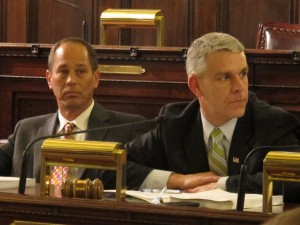Political Pressure Led Philadelphia Democrats To Back Impact Fee

Scott Detrow / StateImpact Pennsylvania
Republican Joe Scarnati (l) during Monday night's conference committee vote
Why did a liberal Democrat who once called the Senate’s Marcellus Shale impact fee “absurd” end up voting for the bill?
Senator Vincent Hughes said he was threatened.
The man who allegedly did the threatening, Senate President Pro Tem Joe Scarnati, framed the discussions a different way. Scarnati said the negotiations were aimed at generating more bipartisan support for legislation re-writing gas drilling regulation, and creating an impact fee on gas wells.
Both men agree on this: if Philadelphia Democrats hadn’t voted for the legislation, their city would have received less money from impact fee revenue.
While the majority of impact fee money would stay in counties and municipalities that host Marcellus Shale wells, 40 percent of the revenue would go to state agencies. That money would trickle down to local governments through project-specific grants, as well as formulas doling out money for recreation projects, infrastructure, and other local programs. Scarnati told Hughes and other Philadelphia Democrat, Anthony Williams, that without their support, the distribution format would change, and Philadelphia would see less fee money.
“I deemed the threat credible and real, and had to respond accordingly,” said Hughes. Williams said his “yea” vote was based on similar conversations with Scarnati. “It was clear they had the votes to move it out of the Senate whether we voted for it or not,” explained Williams.
So why did Scarnati exert pressure on the Democrats? He said he had grown frustrated by Democratic lawmakers requesting change after change in the impact fee, but who continued to oppose it. “This is not a buffet,” Scarnati said. “This is a sit-down dinner, and all things are included in the dinner. You don’t just pick and choose what you like out of it, and stand and pontificate and vote against it.”
The major change Scarnati put on the table: changing the way the Commonwealth Financing Authority would approve impact fee-funded projects. The CFA is a four-member panel, made up of Democrats and Republicans. Unanimous votes are needed to approve funding for specific projects. Scarnati warned the Democrats he’d change the authority’s voting regulations, so Republicans could decide where impact fee money went. “My message to them was very clear,” Scarnati explained. “There are programs being driven through the [Commonwealth Financing Authority]. And the CFA is a bipartisan commission that moves projects through.”
“I’m not about to stand here and put up all the votes in my caucus while you just pick the buffet items,” continued the one-time restaurant owner. “We would all like to eat the filet mignon off the buffet and not have to eat the vegetables. But the vegetables come with it.”
Scarnati would have also tweaked population-based funding formulas that drove millions of dollars to counties like Philadelphia, Montgomery and Bucks, where there’s no Marcellus Shale drilling. His chief-of-staff, Drew Crompton, said Senate Republicans were frustrated the impact fee would send $15.7 million in infrastructure funding,yet the city’s legislators weren’t voting for it. Under the population-based formula, drilling-heavy Washington County would only receive $256,000 in transportation-specific funding. Tioga County would take in about $50,000. Of course, the majority of impact fee revenue will remain at the local level under the impact fee’s formula, which sends 60 percent of the money to counties and municipalities hosting wells.
“That’s how we came up with some votes,” said Scarnati.
Hughes, who once said the impact fee “falls woefully short,” was frustrated by what he called hardball tactics. “Philadelphia’s a part of the Commonwealth of Pennsylvania. An important part of the Commonwealth of Pennsylvania. I could not allow Philadelphia in any way shape or form to be cut out.”
















